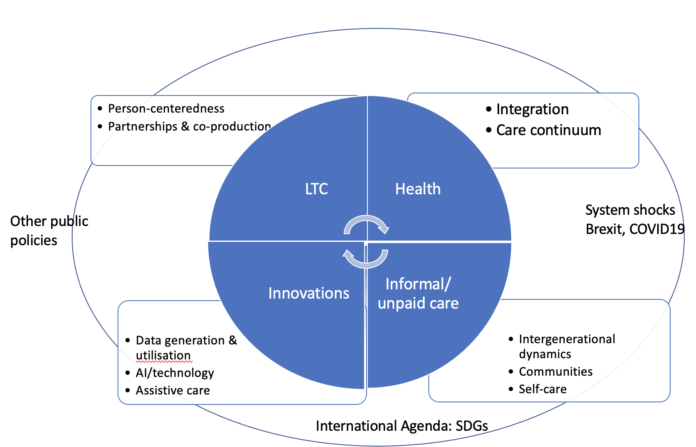إن الشيخوخة العالمية هي ظاهرة خلقت فرصا كبيرة فضلا عن تحديات كبيرة. إن طول العمر والزيادات في سنوات الصحة تولد مجموعة من الفوائد المجتمعية والفردية. ومع ذلك، لا يتم قضاء كل السنوات الإضافية من الحياة في صحة جيدة، مما يفرض متطلبات متزايدة على النظم الإيكولوجية للرعاية التي تشمل خدمات الصحة والرعاية الرسمية وغير الرسمية وآليات الدعم. علاوة على ذلك، فإن ديناميكيات شيخوخة السكان نفسها تستلزم تغييرات في الهياكل السكانية، مثل توافر الفئات في سن العمل وكذلك وحدة الأسرة نفسها، مما يفرض تحديات على توافر وقدرة مختلف الجهات الفاعلة داخل النظم الإيكولوجية للرعاية على لعب دورها. دورهم في تلبية المطالب المتصاعدة. إذا نظرنا على المستوى العالمي، فإن أسرع التحولات في هياكل الشيخوخة تحدث حاليا في البلدان المنخفضة والمتوسطة الدخل (LMICs).
وسوف تشهد العديد من البلدان المنخفضة والمتوسطة الدخل مثل هذه التحولات في غضون أقل من 20 عامًا مقارنة بما يزيد عن مائة عام في بعض الدول الأوروبية مثل فرنسا وإنجلترا. وتشير تقديرات منظمة الصحة العالمية إلى أنه بحلول عام 2050، سيعيش 80% من كبار السن في العالم في البلدان المنخفضة والمتوسطة الدخل، مما يدعو إلى إعادة تقييم وتطوير سياسات الرعاية الصحية الحالية والجديدة بشكل عاجل لتشمل آليات الدعم الرسمية/غير الرسمية والفردية/الحكومية. في هذه الندوة، أقدم لمحة عامة عن الشيخوخة العالمية متبوعة بتفسير لأنظمة الرعاية البيئية مع استخلاص أمثلة من البلدان ذات الدخل المرتفع والبلدان ذات الدخل المنخفض.
في هذا العرض، يستكشف البروفيسور حسين العلاقة الديناميكية بين مجالات الرعاية الرسمية وغير الرسمية باعتبارهما مكونين تفاعليين حيويين للنظام البيئي الشامل. وتستند بعض هذه الأدوار إلى التفضيلات المفترضة وتوافر الدعم غير الرسمي، وتسترشد بالتحديات المالية والتحديات المتعلقة بالبنية التحتية، من بين عوامل أخرى. سأناقش الروايات السياسية المتزايدة في أوروبا حول أهمية الشبكات غير الرسمية مثل "الدعم بين الأجيال"، و"مجتمعات الرعاية"، والدعم الذاتي الفردي كعناصر مكملة، وربما بدائل لخدمات الرعاية طويلة الأمد الأكثر رسمية.
وهي تبني هذه المصالح المتجددة وتقارنها بالدعم الحالي للرعاية طويلة الأمد في البلدان المنخفضة والمتوسطة الدخل، وذلك باستخدام الشرق الأوسط كمثال إقليمي، والذي يعتمد بشكل شبه كامل على آليات الدعم غير الرسمية هذه. ويُنظر إلى مجالات الرعاية الرسمية وغير الرسمية هذه من خلال عدسات مختلفة ضمن المشهد السياسي، ومع ذلك يمكنها الاتصال أو الانفصال عن أدوارها المفترضة وقدرتها على تحقيق النتائج المرجوة. توجد مثل هذه الأدوار أيضًا في إطار تحويل المسؤوليات عبر الإحلال والتكامل بين مختلف الجهات الفاعلة: الدولة والمجتمع والأسرة والفرد. يدعو البروفيسور حسين إلى تطوير نهج ديناميكي للنظام البيئي للرعاية يعترف بعدم المساواة والتحيز بين الجنسين عند تولي الأدوار لمختلف الجهات الفاعلة، ولكنه يتكيف مع التغيرات عبر مسار الحياة والعوامل الخارجية، مثل التكنولوجيا والهجرة.
شوسين-PHPSندوة-21 مايوالمؤسس والمدير
شيرين حسينهو أستاذ سياسة الرعاية الصحية والاجتماعية في كلية لندن للصحة والطب الاستوائي (LSHTM)، المملكة المتحدة.
أسست شيرين شبكة Menarah في عام 2019، بمنحة أولية من صندوق أبحاث التحدي العالمي، UKRI. وهي خبيرة في علم السكان الطبي ولديها خبرة في الشيخوخة وديناميكيات الأسرة والهجرة وأنظمة الرعاية الطويلة الأجل. تتعاون شيرين بانتظام مع الأمم المتحدة ومنظمة الصحة العالمية والبنك الدولي في السياسات والأبحاث التي تركز على الشيخوخة في منطقة الشرق الأوسط وشمال أفريقيا.
حصلت شيرين على شهادتها الجامعية في الإحصاء ودرجة الدراسات العليا في علوم الكمبيوتر من جامعة القاهرة. حصلت على درجة الماجستير في الديموغرافيا الطبية من كلية لندن للصحة والدكتوراه في الديموغرافيا الكمية والدراسات السكانية من كلية لندن للاقتصاد والعلوم السياسية، المملكة المتحدة.



